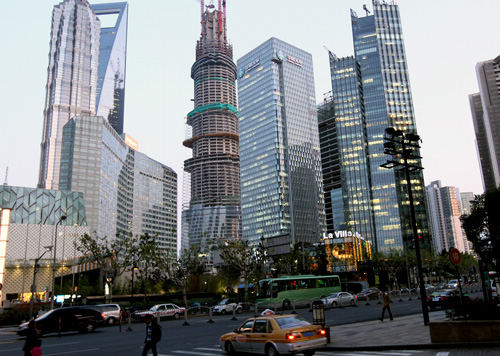|
 |
|
A SCENE OF PROSPERITY: The emergence of Shanghai as a financial center in the past two decades demonstrates China's achievements in its latest period of strategic opportunities for development (XINHUA) |

General Zhang Qinsheng, Deputy Chief of the General Staff of the Chinese People's Liberation Army, recently spoke with Study Times, a newspaper published by the Party School of the CPC Central Committee, sharing his perspectives on China's strategic opportunities for development. Excerpts are as follows:
Study Times: How to understand "China remains in an important period of strategic opportunities for its development" written in the report to the 18th National Congress of the Communist Party of China (CPC)?
Zhang Qinsheng: It has three levels of meaning. First, the basic circumstances shaping the strategic opportunities for China's development remain unchanged. Second, we must identify factors with impact on China's development opportunities amid changes of international situations, and try to win opportunities by fending off unfavorable changes. Third, the CPC Central Committee should concentrate all its efforts on ensuring the realization of building a moderately prosperous society in all respects by 2020 by making full use of these opportunities.
What are connotations of the concept of "strategic opportunities for development?"
From the perspective of history, strategic opportunities for development, which do exist in reality, do not only favor one country or a certain group of countries. Different types of countries, large or small, landlocked countries or maritime powers, all have their own strategic opportunities. Historically, such occasions include improvement in the means of production in the agricultural society, development of maritime skills during the Age of Discovery, productivity growth during the Industrial Revolution and the ongoing information revolution. Almost all strategic opportunities appeared in the company of industrial restructurings and the development of productivity. Thus, these changes present equal opportunities to all countries and nations. Countries that can take advantage of these opportunities would develop their strength while those that miss out on these opportunities would lag behind other countries.
Strategic opportunities are only available to countries that strive for them. Countries cannot just wait to benefit from such strategic opportunities. Instead, it requires the strategic wisdom of state leadership and their people's entrepreneurial spirit.
Over the five centuries since the beginning of the 15th century, China missed out on three strategic opportunities. In the middle of the Ming Dynasty (1368-1644), countries of Western Europe entered the Age of Discovery, when Europeans explored Africa, the Americas, Asia and Oceania. During the same period, after Zheng He commanded voyages to Southeast Asia, South Asia, the Middle East and Africa from 1405 to 1433, emperors of the Ming Dynasty imposed bans on foreign trade and implemented a closed-door policy. In the mid-19th century, Britain became the first country to complete the Industrial Revolution, which paved the way for it to become an empire "where the sun never sets." Meanwhile, China clung to the feudal system despite signs of its decline. In the latter half of the Qing Dynasty (1644-1911), both China and Japan launched westernization movements, which ended differently. While Japan emerged as a modernized nation in the early 20th century after the Meiji Restoration, in China a 100-day reform movement in 1898 undertaken by Emperor Guangxu and his supporters ended in a coup d'état by powerful conservative opponents.
The strategic opportunities China has used in its economic development over the past decades are the result of efforts of several generations of entrepreneurial Chinese builders.
The strategy a country adopts in dealing with international relations is significant to its survival and development. For example, in the 1970s, then Chinese leader Mao Zedong strategically developed China's relations with Western countries, paving the way for normalization of Sino-U.S. relations. This maneuver lowered China's risk of entering a major war with the Soviet Union, moved China to a more advantageous position during the confrontation between two superpowers and earned the country strategic space for its development.
Strategic opportunities are decisive for a country's development. The success of a nation's renewal drive relies on its capacity to make the best use of these opportunities.
World War II had devastated the Japanese economy and Japan's desire to catch up with the West. Under the leadership of Prime Minister Shigeru Yoshida, Japan began to place a premium on unrestrained economic growth and education. Benefiting from the Cold War, Japan's economy achieved miraculous growth despite the ruins of war.
| 